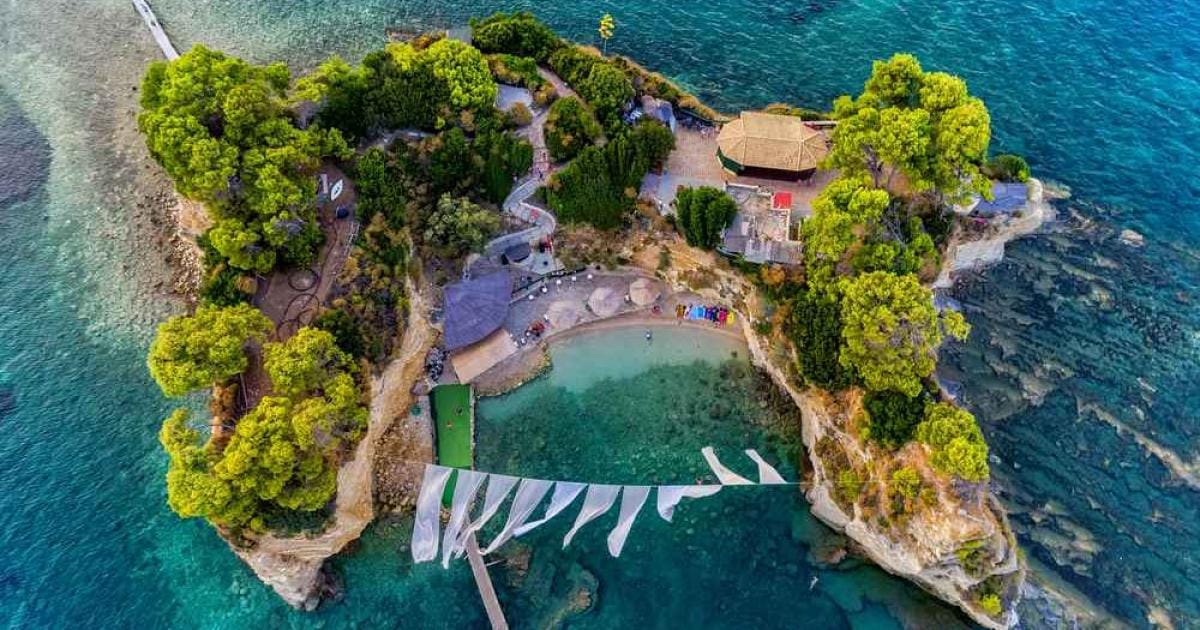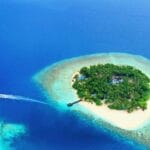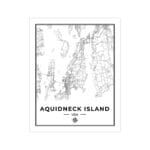Get ready for an incredible trip to the tiniest inhabited islands on Earth. They’re like little hidden gems in the middle of the ocean, with their own amazing stories to tell. From the super-small Just Room Enough Island, which has only one house and one tree, to the rugged Søre Steinskjeret, where people love to kayak and dive, these tiny lands show us how humans can live in even the most challenging places. Join us as we dive into the history, meet the awesome people who live there, and marvel at the amazing views of these extraordinary islands.
Smallest Inhabited Island in the World
Ever dreamt of escaping to a tiny island, a world away from the hustle and bustle? You know, the kind of place where everyone knows your name and life moves at a slower pace? Well, believe it or not, there are people out there living that dream on some of the tiniest specks of land you could imagine!
Now, when we say “smallest inhabited island,” it’s easy to picture a deserted beach with just a lone palm tree. But we’re talking about places where people actually call home, year-round.
Take Just Room Enough Island, for example. This little slice of paradise sits right in the middle of the St. Lawrence River in New York State. Can you guess how big it is? Hold your breath, because it’s a whopping 3,300 square feet! That’s barely bigger than your average city apartment! Amazingly, a single family decided to make this their own private oasis, complete with a house, a tree, and a tiny beach. Talk about tight living!
But Just Room Enough Island isn’t the only island vying for the title of “smallest.” Before Just Room Enough claimed the title, Bishop Rock, a remote lighthouse location off the coast of England, was considered the smallest. However, with the automation of the lighthouse, it no longer requires permanent residents.
And then there’s Anuta Island, way out in the vast Pacific Ocean, part of the Solomon Islands group. This Polynesian gem is a true testament to human resilience and community spirit. Despite its small size – we’re still talking pretty tiny here – Anuta boasts a vibrant culture and a population that thrives on their little slice of paradise.
Over in Indonesia, amidst a chain of thousands of islands, you’ll find Simping Island. Imagine standing anywhere on this island and being able to see the entire horizon – that’s how small it is! It really gives you a sense of just how vast the ocean is and how small we are in comparison.
But the prize for the most intriguing tiny island might just go to Nichtarguér Island in France. This island plays a fascinating game of hide-and-seek with the tide. At high tide, it completely disappears beneath the waves, only to reemerge as a tiny, rocky outcrop when the tide recedes. It’s a powerful reminder of the ever-changing nature of our planet.
Finally, let’s not forget Søre Steinskjeret Island in Norway. Known for its rugged landscapes and towering fjords, Norway also boasts this minuscule island, highlighting the incredible diversity of its geography. It’s surprising to consider that a country known for its vast landscapes would also be home to one of the smallest inhabited islands.
These tiny islands might not be featured in your typical travel brochures, but they offer a unique glimpse into the resilience of the human spirit and the amazing diversity of our planet. They remind us that adventure can be found in the most unexpected places, even on a piece of land barely larger than your backyard. So, the next time you’re feeling adventurous, why not explore the world of tiny islands? You never know what wonders you might uncover.
Where Is the World’s Smallest Inhabited Island Located?
So, you think you’ve seen small islands? Get ready to have your mind blown! Tucked away in the scenic Thousand Islands region, right on the border of New York and Canada, lies a little slice of land called Just Room Enough Island. And guess what? It lives up to its name! This tiny island is a mere 3,300 square feet – that’s smaller than a basketball court!
Now, you might be thinking, “How can anyone even live on something that small?” Well, that’s the amazing part. Back in the 1950s, the Sizeland family bought the island and decided to build a house and, get this, a single tree! Talk about cozy living!
Interestingly, Just Room Enough Island wasn’t always considered the smallest inhabited island. That title used to belong to a place called Bishop Rock, way over in the UK. But here’s the thing – Bishop Rock had a lighthouse that eventually became automated, meaning no one needed to live there anymore. And that’s how our little champion in New York snagged the title!
It’s pretty fascinating, right? This tiny island challenges our idea of what “livable” really means and reminds us that sometimes, the most incredible things come in the smallest packages.
What Makes an Island Habitable? Exploring the Essentials
We’ve already talked about how size isn’t everything when it comes to whether people can live on an island. Just think of Just Room Enough Island, which is barely bigger than a basketball court, yet a whole family calls it home! On the flip side, Bishop Rock, once famous for being the tiniest inhabited island, is now completely deserted because everything there is automated. So, what else plays a role?
Let’s dive in!
Location, Location, Location (and a Few Other Things)
Imagine an island like a house. You wouldn’t want a house with leaky pipes, no electricity, and far away from any stores, right? Islands are similar!
Here’s what we need to think about:
- Proximity to Larger Landmasses: Islands close to continents or bigger islands have a head start. It’s like having friendly neighbors who can lend you a cup of sugar, except in this case, it’s more like sharing resources and trade opportunities. Plus, being closer to larger landmasses can sometimes offer a bit of protection from the full brunt of harsh weather.
- Natural Shelters: Some islands are lucky enough to have natural barriers like coral reefs or surrounding islands. These act like shields, lessening the impact of strong ocean currents and storms.
- Mother Nature’s Bounty: Freshwater sources are like gold on an island! You need them for drinking, growing food, and everyday life. And speaking of food, an island needs enough fertile soil, plants, and animals to support its residents. Of course, importing food is an option, but that brings us to our next point…
- Transportation and Communication: Even if an island has everything else, it won’t thrive if it’s cut off from the world. Good transportation links for trade and, importantly, reliable communication systems for emergencies are vital.
So, What Exactly Makes an Island Livable?
Think of it like this:
- Water, Water Everywhere (and It’s Drinkable!): We can’t stress this enough – access to clean, fresh water is non-negotiable.
- Food, Glorious Food: Whether it’s farming, fishing, or importing, an island needs a sustainable way to feed its people.
- Home Sweet Home: Building materials should be readily available, and the climate needs to be suitable for constructing durable shelters.
- Power Up!: Just like any home, an island needs a reliable energy source. This could be anything from traditional fuels to harnessing renewable resources like solar or wind power.
- Keeping it Clean: Waste management is essential. Without proper systems in place, an island risks polluting its limited environment and resources.
Can You Really Be Happy on a Tiny Island?
Living on a small island is a bit like living in a small town – it has its charm and its challenges.
On the Plus Side:
- Tight-Knit Community: Island life often means strong community bonds and a sense of belonging.
- Peace and Quiet: If you’re looking for a break from the hustle and bustle, a small island offers tranquility and stunning natural beauty.
- Low Crime Rates: Smaller communities often translate to lower crime rates, providing a sense of safety and security.
But There’s Also the Flip Side:
- Island Fever is Real: Isolation can be a double-edged sword. Limited access to goods, services, and social opportunities can be challenging for some.
- Jobs Can Be Scarce: Small islands often have limited economic diversity, making job opportunities, especially for younger generations, a concern.
- Nature’s Fury: Let’s face it, islands are at the mercy of Mother Nature. Hurricanes, storms, and rising sea levels pose constant threats.
The Bottom Line
While challenges exist, many people wouldn’t trade their island life for anything. It’s a unique blend of simplicity, community, and a deep connection with nature. If you’re considering making a move to an island, weigh the pros and cons carefully. It’s not for everyone, but for some, it’s paradise found!
A Closer Look at Life on Just Room Enough Island
Picking up where we left off, let’s dive into the nitty-gritty of life on Just Room Enough Island. Imagine waking up each morning with a 360-degree view of the shimmering water – talk about a room with a view! But this incredible sight comes with its own set of, shall we say, “unique” living conditions. Forget about popping over to the store for a gallon of milk; on Just Room Enough, you’re living the definition of self-sufficiency.
No plumbing, no electricity from the grid, and definitely no popping out to grab a pizza. Island residents rely on rainwater collected in barrels – a precious commodity – and solar panels to power their humble abode. Think composting toilets are just a trendy eco-thing? Here, they’re a way of life. It’s about as far from a luxury apartment in the city as you can get, but there’s a certain charm to it, wouldn’t you say?
Living on a sliver of land in the middle of a river means learning to roll with the punches, literally. Strong winds can whip across the island, and storage space is at a premium. Every object, every piece of furniture, has to justify its existence. It’s minimalism taken to a whole new level!
But perhaps the most important lesson Just Room Enough Island teaches us is the importance of respecting our environment. With limited resources and the constant presence of nature, sustainable living isn’t a choice – it’s a necessity. Every action, from composting food scraps to conserving water, has a direct impact on the delicate balance of this tiny ecosystem.
While scientists continue to study the long-term effects of human habitation on such small islands, one thing is certain: Just Room Enough Island stands as a testament to human resilience, ingenuity, and our enduring fascination with life on the edge. It begs the question, in a world increasingly focused on bigger and better, could we all learn a thing or two from this tiny island and its resourceful inhabitants?
Learn about the pocket-size smallest island in the world, it is extremely tiny that is not exactly shown on the Map. Furthermore, if you are looking for a small tropical island for your trip, this one will be perfect. Lastly, the stunning smallest populated island in the world will captivate you with its surreal beauty.
- Sept 31 Myth: Unveiling Calendar Secrets - March 18, 2025
- How Long & Till December 18, 2025: Accurate Countdown Guide - March 18, 2025
- Discover Japanese Artists: A Complete History - March 18, 2025
















